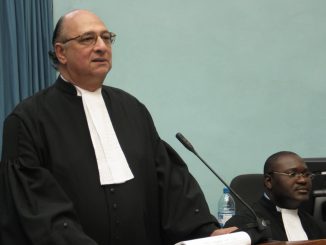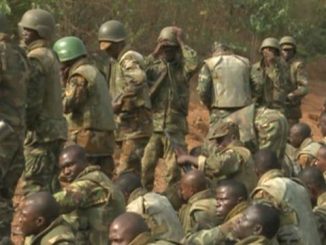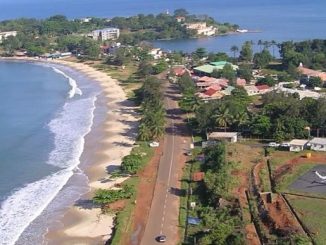
PRESS RELEASE
Subject: Ebola transmission in Sierra Leone over : Nation enters 90-day enhanced surveillance period
On 7 November 2015, if no new case of Ebola virus disease is recorded, Sierra Leone will have met the criteria set by the World Health Organization (WHO) for declaring the end of Ebola transmission. If Sierra Leone meets that milestone, on that day, the WHO will declare the end of Ebola transmission in Sierra Leone, at an event organised by the Government of Sierra Leone through the National Ebola Response Centre (NERC).
The declaration will take place at a formal ceremony at the Bintumani Conference Centre, Bintumani Hotel Ground in Aberdeen and will be attended by His Excellency the President of Sierra Leone Dr. Ernest Bai Koroma, key government officials, local government and traditional authorities, religious leaders, heads of political parties, members of the international community, healthcare and Ebola response workers and non-governmental organizations, the press and representatives of civil society.
Statement by Key Response Leaders:
- Dr Anders Nordström, Country Representative, WHO
- Ms Bintou Keita, Ebola Crisis Manager for Sierra Leone, Interagency Collaboration on Ebola
- A Representative of the United Kingdom
- Dr. Abu Bakarr Fofanah, Minister of Health and Sanitation, Sierra Leone
- Major (Rtd.) Palo Conteh, NERC CEO
- The Keynote address will be delivered by His Excellency the President of Sierra
Leone Dr. Ernest Bai Koroma
Date/time:
Saturday 7 November 2015, 8:00 Freetown, GMT
Place: Bintumani Conference Centre
——————————————————————-
Requested by :
Tunis Yahya, Director of Communications,NERC
Mobile: +232 788 49998
Email: tunisys12@gmail.com
Ebba Kalondo, Communications,WHO
Mobile: +232 76 533 284
Email: kalondoe@who.int
Messaging for November 7th
Q& A
Is it true that the WHO has declared Sierra Leone Ebola Free?
No, the World Health Organization declared the current EVD outbreak in Sierra Leone over because the country has gone for 42 consecutive days without recording a new EVD case since the two consecutive negative test results from the last confirmed Ebola patient. They were discharged on 25 September.
We have achieved this because we all worked together as a country and continuously did the right things. We must also be thankful for the support we got from the International Community, which contributed immensely to the national Response.
What are some of the key strategies implemented by the country to end this outbreak?
It has been a combination of many strategies, we quickly realized that the number of confirmed cases in communities across the country were many and people were still in denial and so we quickly established beds with help from the international community and then did the “Sit at home”. These first two strategies helped us raise awareness on the disease and also removed a good number of suspected and positive cases from the communities. We then increased ambulance availabilities and established command and control structures in all the districts across the country, declared state of emergency and banned all traditional practices. Gave authorities to local leaders to implement by-laws and embarked on massive social mobilization led by His Excellency the President, Dr. Ernest Bai Koroma. In a nut shell, quick isolation, Safe and Dignified burials, ban on traditional and some religious practices, social mobilization, quarantine and local by-laws were some of the key strategies used to combat the disease
How much support did the country receive from the International Community to end this outbreak?
The support from the International Community was tremendous. Some may say it came late, but in the end it is good that they came onboard. The British Government sent in personnel and the British military and within record time we had seven hundred bed treatment facilities constructed across the country, which helped move suspected and confirmed cases from the communities into these beds, labs were constructed and processes and structures were established across the districts that helped us manage the outbreak. The US Government also came onboard with support through the CDC and USAID. The EU, China and other countries were all very helpful in establishing treatment centres and sending personnel. The United Nations family coordinated first by UNMEER and now WHO has been invaluable, so too was the African Union and the entire donor community. We are grateful for their support.
Tell us the impact of this outbreak on the country in terms of total confirmed infections and deaths:
As of yesterday, according to data from the Ministry of Health and Sanitation, the country recorded 8,704 total confirmed cases and 3,589 confirmed deaths. There are probable and suspected cases, which may increase those numbers. 221 Health care workers were among the 3,589 Sierra Leoneans that we lost to this virus. What is however, encouraging is that we have a huge number of survivors about 4,051.
What if Sierra Leone records a new case after this declaration?
The WHO will declare another outbreak for Sierra Leone, but it will not be the continuation of this outbreak. Remember that a single case of Ebola is considered an outbreak. With all the lessons learned from this outbreak, the country now has the rapid response capacity and the strategies that work to respond to any new outbreak. We remain on full alert and are fully prepared to quickly respond to any new threats.
Now that the WHO has declared the outbreak ended, what will happen to the NERC?
The mandate of the National Ebola Response Centre was to break the chain of transmission and end the current outbreak. However, His Excellency the President has instructed that the NERC continues its operations until the end of December, which is when the NERC will transfer its functions to the Office of National Security (ONS) and the Ministry of Health and Sanitation
Will the NERC or Government shut down all the laboratories and treatment centres used during the outbreak?
While some of the centres and laboratories have already been shut down due to the significant reduction in cases, some remain. Numbers will be adjusted to adapt to the new realities, but every region will continue to be served by a strategically located laboratory and a treatment facility.
What will happen to the volunteers who served as Ebola Response Workers?
Many of the volunteers that were hired during the course of the outbreak would have to be laid off now that the outbreak has ended. However, those who were volunteer nurses will have the opportunity to be embedded into the Ministry of Health and Sanitation. Other volunteers have also acquired skills that will eventually earn them employment in other organizations. I would advise that they exercise patience and know that the skills they have acquired will surely provide opportunities for them in the future. This country will forever remain grateful for their sacrifices and services during this outbreak
Will the State of Emergency continue now that the WHO has declared the outbreak ended in Sierra Leone?
His Excellency the President has made a decision to rescind the State of Emergency. The decision will then go to Parliament for ratification, but I must remind you that certain measures remain in place. Screening and hand washing stations at major checkpoints and borders will continue.
Will the 117 call centre continue?
117 hotline was established by the Ministry of Health and Sanitation for the Free Health Care and was upgraded during the Ebola outbreak. The 117 call centre will continue to exist, but its mode of operation and coverage will depend on the Ministry of Health and Sanitation. The current plan is to maintain it as a national health emergency hotline. The same applies to the districts that have their own hotlines.
Will the Safe and Dignified Burial Policy continue?
We will be shifting to targeted Safe and Dignified Burial as from the 7th of November. Swabbing for all deaths is mandatory until June 2016. A swab card will be issued to families so that they can get a burial permit. This will also serve to document deaths in the country. Standby burial teams will be maintained in all districts in the case of a suspicious death. Continue to call 117 and district call centers to report ALL deaths
Core Message
Our memory of the EVD fight is what will propel us forward in honor of those who are no longer with us today. Success through vigilance for all Sierra Leone, we stand stronger than before and better prepared for the future
The Fight is Not Over:
· While we have come a long way together as a nation to this point, we must remain vigilant. We cannot relax our guard.
· The fight will not be over until we have had zero cases for 42 days here in Salone AND our neighbors in Guinea and Liberia have had zero cases for 42 days.
· Even as by laws, trade and other restrictions are eased, keep taking actions to protect yourself, your family, and your community.
o Wash hands frequently with soap and water.
o Do not touch a sick person or the sick person’s body fluids, or anything they have touched.
o Do not touch any dead bodies, or touch anything a person who has died has touched.
- We should celebrate as a community and country when people go for medical care and practice safe, dignified medical burials. For now, we must stop unsafe practices so we can stop Ebola in Sierra Leone.
· Ebola has killed thousands of people in Sierra Leone, and it is important to honor our deceased loved ones with respect and dignity.
· We honor those who have died from Ebola when we promise to stop the spread of the virus.
· Ebola has claimed the lives of so many: young, old, wealthy, poor, male, and female. We are all at risk for contracting Ebola.
· Ebola continues to spread through contact with the body fluids of those who are sick with Ebola and those who have died from Ebola.
Swabbing all dead bodies is key to keep Ebola at bay
· We are now shifting to targeted safe and secure burials for the highest risk deaths from Nov 7
· Swabbing for all deaths is mandatory until June 2016
· Standby burial teams will be maintained in all districts in the case of a suspicious death
· Continue to call 117 [and district call centers] to report ALL deaths.
· A swab card will be issued to families so they can get a burial permit and document deaths.
· Make sure all bodies are swabbed by the swabbing teams.
· Ebola does not hurt/change our culture or who we are, it only changes our practices and tradition [for now].
· But, as Sierra Leoneans, the way we show respect to our loved ones does not change.
o Our culture as Sierra Leoneans is to protect our families. Safe and dignified burial practices can help us protect our families and stop Ebola.
Our strategies to protect our communities work! Let us continue
· Do not touch, wash, or clean the body if the death is suspicious.
· Do not touch body fluids of a dead person or anything a person who has died from Ebola has touched while they were sick.
If you suspect Ebola, get Early Treatment
· Get help; call 117 or a district hotline. Calling 117 is the best way to get a sick person into treatment or protect your family if someone dies.
· Early medical care saves lives. Early treatment can increase the chance for survival.
· Patients who go to an Ebola Treatment Unit (ETU) or Community Care Center (CCC) are helping protect families and loved ones, and helping to prevent infections in more family member.
· Hospitals and health workers are our first line of defense in the fight against Ebola. They are there to heal and protect you and your family.
· Health facilities in all districts must continue to “Think Ebola. Think Infection Control.” Protect yourself and your patients.
Recovery, Stigma: We are all Ebola fighters!
· All of us need to continue being Ebola fighters for Sierra Leone, our region and the world.
· While we fight Ebola, all people who die should receive a safe, dignified medical burial by people trained in safe medical burial practices. Call 117 to report all deaths.
Honor Our Ebola Survivors!
It is safe to be around someone who has survived Ebola.
· We must honor those who have survived Ebola, we are all Ebola fighters!
· Our survivors are heroes.
· Survivors played a key role during the Response and give us hope for the future.
· If a person has survived and recovered from Ebola, they can no longer spread Ebola to others through casual contact.
· Men who recover from Ebola should abstain from sex or wear a condom during sexual contact for at least 6 months after recovery. However, it is otherwise safe to be around this person.



